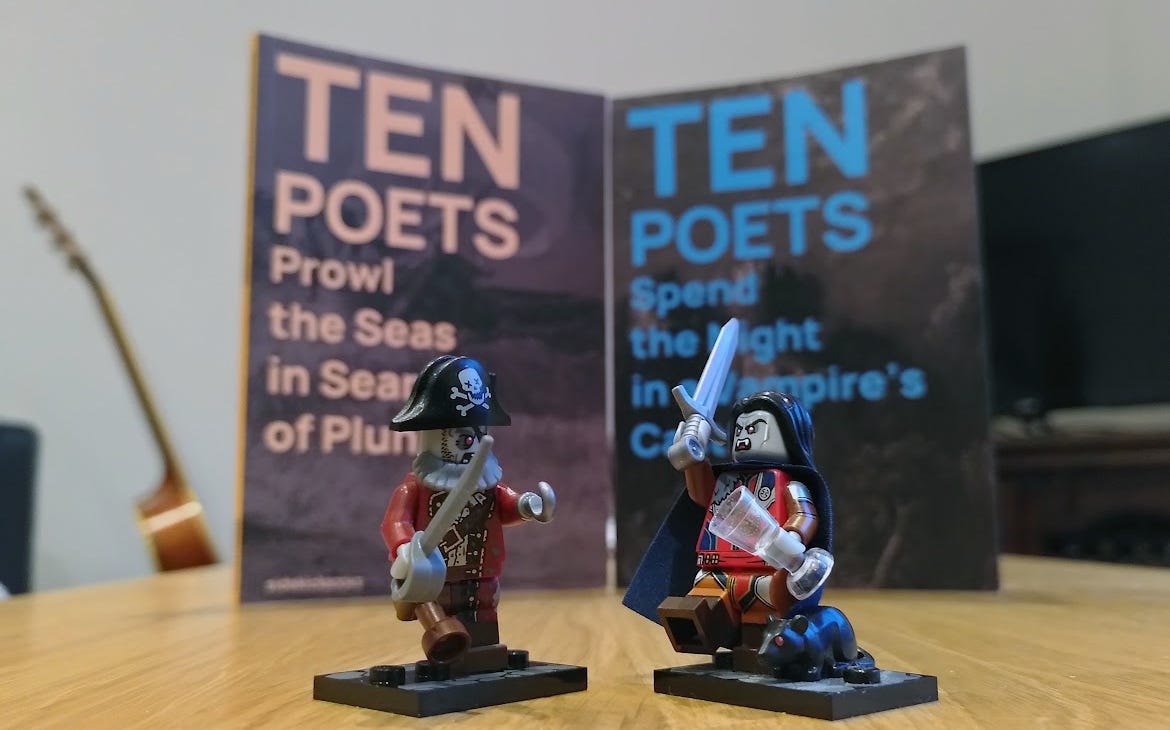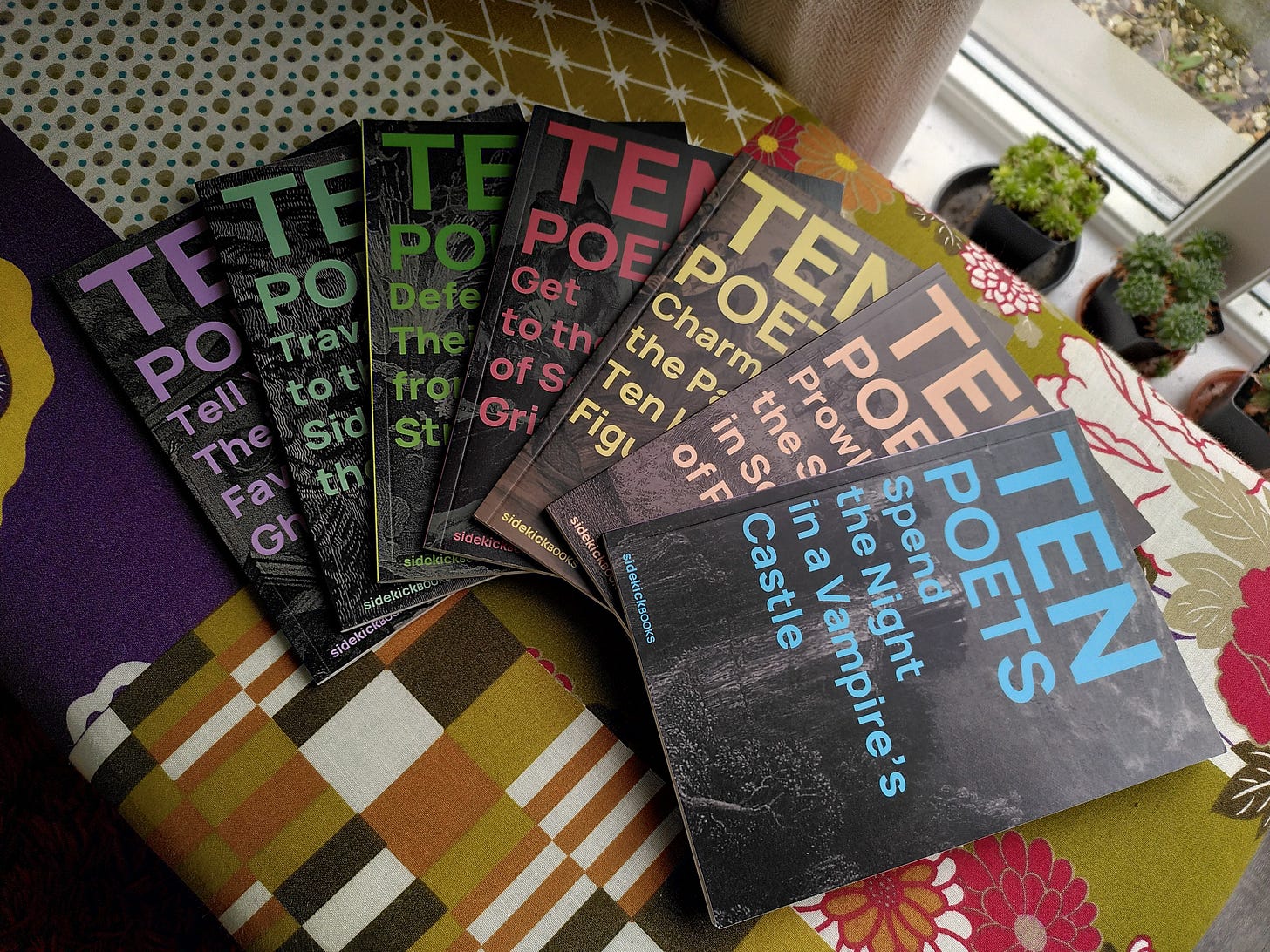From the ‘Foreword’ to
Ten Poets Spend the Night at a Vampire’s Castle:
A tall figure descends the stairs at the centre of the great hall. He is the very picture of calculated languor and boredom, though passion burns in the depths of his bright, dissimilar eyes. He wears a frock coat like a second skin. His open shirt collar erupts from it like the spathe of an arum lily. He is himself peculiarly pale – not the pallor of death, but that of a beautiful alabaster vase. There are fine blue veins upon his features. He is possessed of a boldly prominent brow and delicately cut nose. The hairline recedes around the temples, but the hair itself is dark and thickly curled. The smile strikes at you like a knife – it is contemptuous, almost vindictive.
Vampire? Or poet?
And from the ‘Cast Off’ of
Ten Poets Prowl the Seas in Search of Plunder:
The last poem o’ this here book, Jim-Lad Womack’s ‘Admire Devaluates Scavenger (6, 2, 9, 8)’, finds sixteenth-century Spanish writer Cervantes poised o’er ‘is most famous novel, Don Quixote, wonderin’ ‘ow it be that such a blood-soaked thief an’ murderer as the pirate Blackbeard e’er came to be considered as loveable rogue.
Indeed, mateys, piracy be a topic that raises somethin’ of a double quandary fer poets. On the one ‘and, it be the stuff o’ children’s parties an’ cheap fancy dress. Insufficient gravitas, ye might say. Pantomime patois twice as gratin’ as this one here. Parrots, posturin’, plastic-an’-elastic eyepatches (I once worn two o’ these, one on each o’ me good eyes, while steerin’ a canal boat, but that be a tale for another time). On the other ‘ook, if ye lean toward ‘istorical accuracy, all be grimness an’ squalor.
These are the latest two titles in our ‘10 Poets’ series, starring 20 poets we’ve never published before, many of them fresh to the scene. For those unfamiliar with the series, the premise is all there in the title of each book: contributing poets adopt a persona — lusty corsair, say, or hapless prey of some blood-sucking creature — in order to explore all manner of themes through a somewhat otherworldly lens. That’s it — plus a foreword/introduction and a surprise appendix.
We’re seven books into the run, and we do think they look rather good together:
But it’s the poems, of course, which really count. Try a little spoonful of
Nikki Marrone’s ‘Terms and Conditions Apply’, from
Vampire’s Castle:
The invitation arrived folded in midnight.
No envelope, just a note pressed to my chest:
You’ve been chosen. Glow accordingly.
I must have said yes.
There’s no other way to explain how I got here.
The hours between then and now were soft and slippery,
like the ones gone missing
when you look up and realise the light has changed.
Now I’m seated between a duchess and a woman
who used to be an actress
(though no one mentions that anymore).
The candlelight makes everything soft: the velvet walls,
the blush on their cheeks,
even the wine, which tastes like memory.
“She arrived last week,” someone says, slicing a fig
with the edge of her fork.
Delicious! You thought the poets would, in every case, find themselves alone with the vampire in question? The contents ae wilder than that. As noted in the foreword, “oddly enough […] this might be, as much as anything, a book of love poems.”
And what about
Prowl the Seas? Well, the idea of ‘plunder’ has been interpreted very cleverly, and while we do have a fair number of doubloon-addled ruffians aboard, there’s also room for poetry that plunges into the ‘broken, bent and battered’.
Abigail Ottley’s ‘The Sea Always Wins, or, The Ageing Wreck Diver Speaks of the Ocean’ begins as follows:
The sea is an indifferent lover. She may be your delight, your mistress, your beloved, but she’s not the great prize you imagine. You, in your passion, your tender obsession, are smitten, held fast in her thrall. You see nothing but her beauty, her unplumbed depths, her colours endlessly shifting. But she is nothing if not sly, and her heart is full of perfidy and guile …
You can read the rest of the poem for free,
on our website. Look out for more samples from our books on this Substack in the future, as well as further insights into the pieces and the processes behind their creation. In the meantime, choose your poison:
grog from the belly of a hijacked sloop, or
claret from the cobwebbed bottle cellar? Order it into your local
booze-stop bookshop and help us stay afloat!
And if you are yourself a poet, check out our next calls for submissions to the 10 Poets series, closing 28 February 2026!






 We’re joining the wonderful Dr Briony Hughes to take part in Royal Holloway’s Small Press Takeover series. There’ll be readings, a Q&A and many, many Moons!
We’re joining the wonderful Dr Briony Hughes to take part in Royal Holloway’s Small Press Takeover series. There’ll be readings, a Q&A and many, many Moons!


 If you’re not familiar with the
If you’re not familiar with the 




 The next event we’re co-organising (with the
The next event we’re co-organising (with the 







